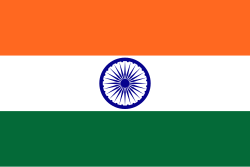| India at the 1982 Commonwealth Games | |
|---|---|
 | |
| CGF code | IND |
| CGA | Indian Olympic Association |
| Website | olympic |
| in Brisbane, Australia | |
| Flag bearers | Opening: Closing: |
| Medals Ranked 6th |
|
| Commonwealth Games appearances (overview) | |
This was the ninth time India participating in Commonwealth Games [1] India ranked 6th in the medal tally. [2]